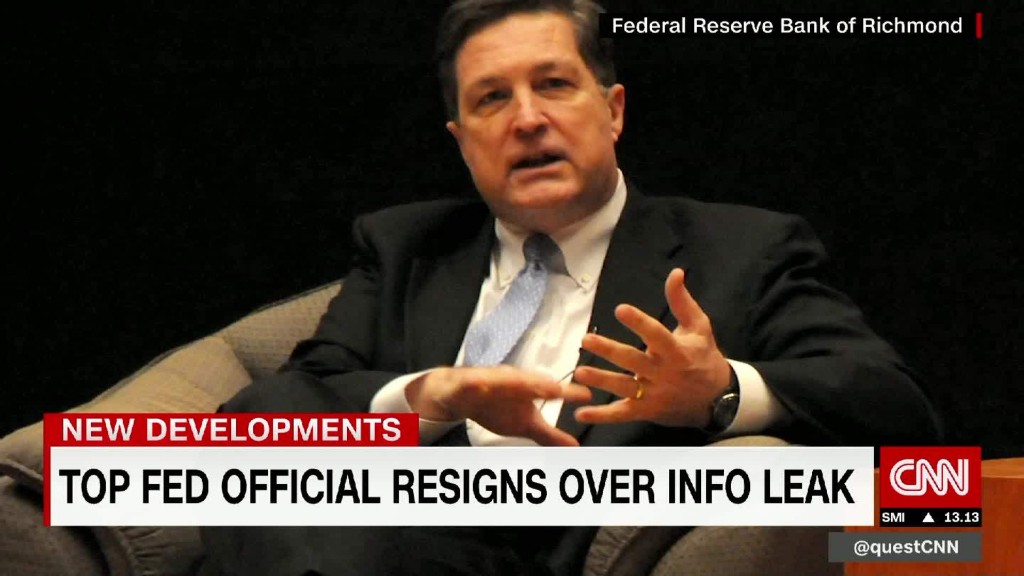
The reputation of America's central bank took a major hit Tuesday.
Jeffrey Lacker, the president of the Federal Reserve Bank of Richmond for 13 years, resigned abruptly after admitting he shared confidential information with a financial firm in the fall of 2012. He's since been questioned by several law enforcement agencies, including the FBI.
"I crossed the line to confirming information that should have remained confidential," Lacker wrote Tuesday in a statement he issued through his lawyer, who said the investigation is now complete and no charges are expected.
"It's a tragedy, it's sad," says Richard Fisher, the former head of the Dallas Fed bank who served alongside Lacker. "I never dreamed Jeff Lacker would have done what he says he has done."
The leak occurred at a time in the Fed's history when it was taking extraordinary steps to revive the U.S. economy after the financial crisis. Its every move was being watched closely around the globe, especially by investors trying to profit from finding out the specifics of the Fed's actions.
Related: Fed official: U.S. economy finally back to normal
Here's what happened
In September 2012, the Fed took the decision to pump more money into the economy by buying bonds to try to boost growth, a policy known as "quantitative easing three" or "QE 3" for short. Lacker was the only person on the board at the time who voted against QE 3.
Lacker says he spoke with someone at Medley Global Advisors, an economic advisory firm in New York, on October 2, two days before the minutes of the September meeting were released to the public.
According to a ProPublica investigation, Medley sent a report to its clients, mostly hedge funds, with details about what types of bonds the Fed was buying. The report was sent a day before the Fed released its minutes to the public.
"I deeply regret the role I may have played in confirming this confidential information and in its dissemination to Medley's subscribers," Lacker wrote in his statement.
The Richmond Fed is one of 12 branches of America's central bank around the country. Its vice president, Mark Mullinix, is now serving as acting head of the Richmond Fed.
The Federal Reserve said in a statement that it is committed to maintaining the security of confidential information from its meetings. It also said that the central bank "cooperated fully with the independent law enforcement investigation into an unauthorized disclosure in 2012."
Fed's integrity called into question
Lacker's leak is a blow to the Fed's credibility. President Trump repeatedly criticized the Fed on the campaign trail, calling it "more political than Secretary Clinton."
Fed officials have repeatedly tried to defend their independence from politics and Wall Street.
"I don't think you can let the transgressions of one individual taint the enormous integrity of the institution," says Fisher.
According to Danielle Dimartino Booth, author of "Fed Up: An Insider's Take on Why the Federal Reserve is Bad for America," the Fed realized there had been a leak from the September 2012 meeting about what the Fed might do next.
It "promoted a 'mole hunt' at the highest levels inside the bank," writes Booth, although she notes they didn't find the mole at the time.
Related: Trump is pushing 'Buy American.' But customers (mostly) don't care
Lacker says he was questioned by the Fed's General Counsel in December 2012 and that he didn't tell didn't tell the full story. Other law enforcement agencies, including the FBI and U.S. Commodities Futures Trading Commission, followed up in 2015.
"The Federal Reserve places a high priority on safeguarding information. We expect every employee to comply with all relevant policies and procedures, as well as our standards of conduct," the Richmond Fed said in a statement confirming Lacker's departure.
A Medley spokesman denied any wrongdoing.
"Medley Global Advisors is a journalistic organization that publishes in-depth macro policy coverage and analysis. Like all other journalistic organizations, reporting necessarily requires working with sources."
--CNNMoney's Matt Egan contributed to this report.





